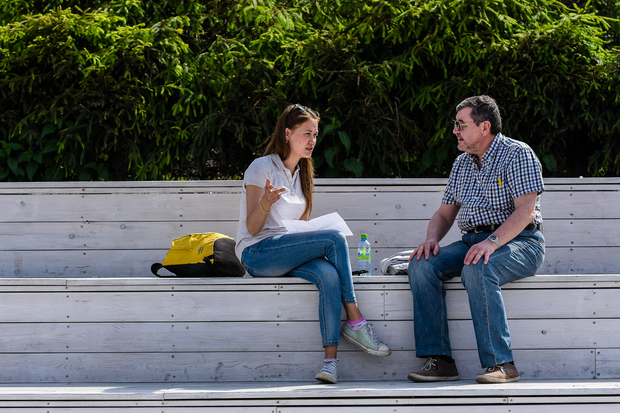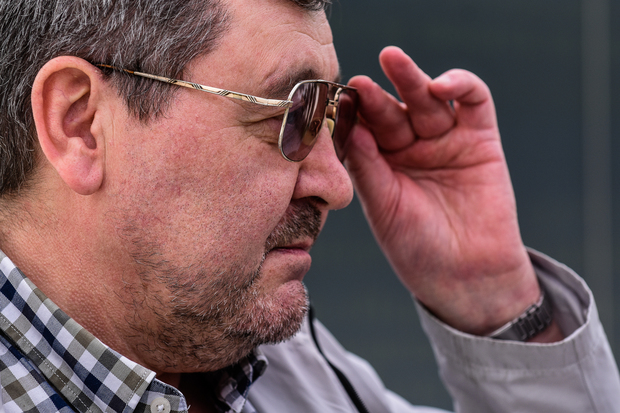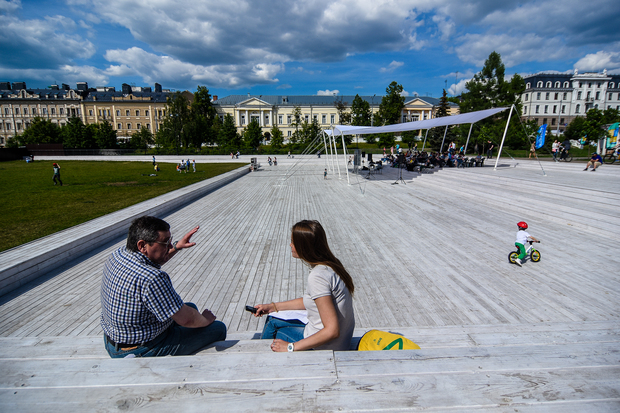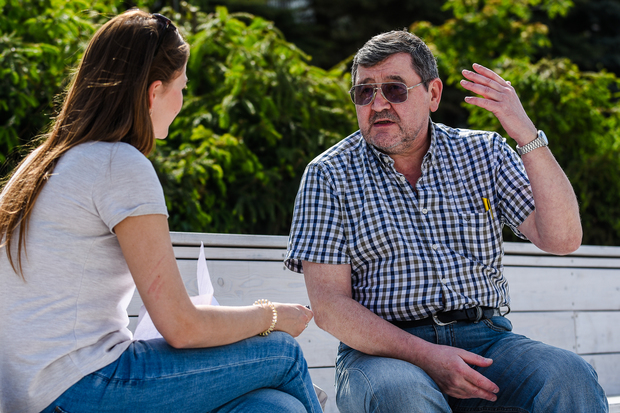Pyotr Obraztsov: ''After the debacle of the Academy of Science, we can say we don’t have academic science''
Realnoe Vremya’s interview with chemist, writer about the harm of homeopathy, safety of GMO and state of modern science
Chemist, journalist and writer Pyotr Obraztsov whose visit was organised together with Prosvetitel award was one of the invited guests of the summer Book Festival. His lectures were about dispelling marketing and pseudo-scientific myths. Realnoe Vremya managed to talk to the speaker and discuss the pseudo-harm of GMO, why homeopathy should study the placebo effect and the state of higher education.
''By nature, I am not Pushkin but Belinsky''
Mr Obraztsov, initially, you started to dispel so-called everyday myths, what you were speaking about at the lecture. Then you talked about pseudo-scientific ones. Why did you decide to deal with it? How did it begin?
I agree. Initially, it was a narrow topic, though with many examples. We tell off either Zepter or some additive or, on the contrary, praise. Then I noticed, indeed, it comes to a system if we add such scientific myths as ozone depletion or global warming, which I consider as an absolute myth, one can study them, and it is even interesting. Now I have quite many books about it.
By the way, many people complain that you criticise but create nothing. What do you think about criticism towards you?
In general, quite indifferently. By nature, I am not Pushkin but Belinsky, you know. Yes, I criticise because there will be people to praise besides me. In addition, they will do it for good money. Try to get to an ad. Then, what can be praised, in fact? To say that milk is an amazing product? It is already known for everybody. We are obviously saying that somebody who likes some product doesn't like it to be criticised. This is why he accuses me of criticising, not creating. I create only articles and books, I don't create products. This is why it is evil criticism that doesn't concern me a lot.
Did the companies, for instance, Calgon, that were criticised asked you not to write critical articles?
Of course! Zepter not only asked. I withstood two trials with them. In addition, I won them. The companies usually say to the media or publishing house where my book with criticism was published, write letters, ask to cope with it, including me, offer to meet up. The end is the same – the company can't do anything on its own but give good money for the ad. By the way, some time later, our expertise understood that, actually, we are one of the most important ad suppliers of our newspaper. Once we guessed we earned about ten times more than we did, and it was not bad at all.

There are many supporters of anthropogenic global warming. But much money can be made on it. But I am sure it is a great scam that is just very profitable
Is there any global warming in general?
You already said about global warming. Why do you think it is a myth? Why is this topic discussed a lot in society then?
There are two main questions here. Firstly, is there any global warming in general? It seems there is. Although there is a great deal of scientists who think those calculations in favour of global warming at least are not correct. It is known that the amount of ice sheet in the Arctic is really sharply decreasing. But, for instance, in Antarctica, the amount of snow that becomes ice if it is pressed has suddenly increased. Here everything is quite complicated. But if we presuppose there is warming, another question arises. The Kyoto and Paris Protocols are designed not only for a fight against global warming but anthropogenic global warming that was caused by a big emission of carbon dioxide by our industry, which is a greenhouse gas. How does a greenhouse work? Ultraviolet ranges that warm up the soil pass through it. Infrared radiation is emitted, it doesn't let them go outside. As a result, there is just more warmth in the greenhouse.
People try to explain global warming in the same way. But the thing is that if we compare the amount of carbon dioxide emitted by humankind with the amount of carbon dioxide emitted by nature, a couple of big volcano eruptions are enough to cover the annual volume of such a country as Russia. Then it turned out that not only carbon dioxide but also methane is a greenhouse gas. First of all, methane is found in animal husbandry, for instance, cows emit it. It became idiocy – tens of works where researchers tied plastic bags to cows, measured how much methane a cow collected, multiplied it by the livestock and got some numbers they were given awards for.
There are many supporters of anthropogenic global warming. But much money can be made on it. But I am sure it is a great scam that is just very profitable. Though it is beneficial to a certain degree. Improved plants and factories, refining systems, more sensible attitude to rubbish and so on are needed. And this job is really done, there are some improvements. On the other hand, it could be done without talks about global warming. By the way, the USA left the Paris Climate Agreement. And China that emits the biggest amount of carbon dioxide into the atmosphere doesn't care about it at all. It is nonsense – it won't have results, maybe there was nothing, in general. And global warming as natural factor is a debatable thing.
By the way, Russian ecologists claimed several years ago that Little Ice Age could be back. It was going to take about five years. What do you think about this presupposition? Is it real?
Why not if normal scientists made the presuppositions. As far as I am concerned, meteorology is not accurate science enough. They perhaps did calculations there. By the way, it is unknown whether we don't have global cooling because such periods when it was very cold on the earth have happened recently. Look at Bruegel's painting where people are ice skating in Holland – it is impossible now. It was in the 16 th-17th centuries. Little Ice Age ended. Short global warming can occur now. By the way, the translation is wrong here. The term comes from the word ''globe'' while we say ''global''. It would be correct to call it ''world''.

It would be interesting to know how the placebo effect works. It is what those homoeopaths should do because this effect really exists. A person who believes in the benefit of homoeopathy and this wonderful old man in glasses completely trusts him and takes something, recovers somehow
''GMO are absolutely harmless and beneficial organisms''
Now there are many talks about homeopathy. What do you think about it? Can it be dangerous?
I think it is pseudo-science. Homoeopathy is endless breeding of an acting substance. It is so endless that there is no molecule of this substance. From a theoretic perspective, it just can't treat because there is nothing – only water and lactose. In practice, it is known a number of patients recover in the end.
Can it be the placebo effect?
Yes, I think it is the placebo effect. In this sense, it would be interesting to know how the placebo effect works. It is what those homoeopaths should do because this effect really exists. A person who believes in the benefit of homoeopathy and this wonderful old man in glasses completely whom he trusts and takes something recovers somehow. It means some chemical substances emitted and healed him under the influence of his thoughts and belief. Our organism has, for instance, endorphins. It is, in fact, an internal drug. If it is present, why should not there be any internal aspirin or another medicine? It needs research. But if a person has a serious disease, let him trust this doctor a lot, and if he doesn't take normal medicine, he will die. In this respect, homoeopathy is very dangerous.
Beloved GMO products are no less discussed topic. Could you tell about them?
Genetically modified organisms are absolutely harmless and beneficial organisms, the only thing that can save humankind from hunger. By the way, about one billion of people suffer from hunger. It will be impossible to make something without production of such modern plants, first of all, and animals now. And the criticism of GMO…
Who is interested in it? Indeed, criticism is very active.
It is discussed by critics and, unfortunately, by the majority of journalists. I was a journalist for a long time and know it is not interesting when a dog bit a person. This is why criticism of GMO is really more interesting than its calm analysis. No harm is boring. This is why journalists will write about some mythic harm that doesn't exist in reality on TV and in newspapers. This process is quite lasting because genetic modification has being made for a long time. Hungarian-born Pusztai who turned out to be a crook was the only man. Then there was our Yermakova – semi-illiterate woman who fed mice with maize, and the mice did not live well. But the experiment was awful – it was checked many times. So there has not been any evidence of GMO's harm in these years. But the fact that such a deal arose against them actually has a positive impact because they are checked 100 times better than the plants brought up by usual selection. When Michurin bred chokeberry nobody checked whether it was harmful or not. He tasted it – it was delicious and did not seem to be poisonous. That's it. It continues so now during usual selection. But GMO did much harm to usual selection because it can't compete with them.
The attitude of GMO in Russia is clear. Do other countries use it?
Not only use it. In India, Brazil, America, some kinds of cultivated plants are only genetically modified. For instance, soya, it is opposed to us. Probably there will be scientists who question GMO. But several memorandums of biologists, chemists and other scientists were already written that GMO can and needs to develop with examinations, of course. Some things are still forbidden in some European countries. For instance, in Germany, construction of nuclear power stations is completely banned. But they will be able to do nothing, these power stations will open in the end because there is not any alternative. Although it is a very dangerous thing, of course.
GMO is reproached, for example, for transplantation of scorpion's gene to a plant. But these are those four nucleotides, and stomach acid will dissolve the scorpion's gen into nucleotides, and the neighbouring ferment will eat them. And nothing will happen to you – you won't have a tail or a third hand. We eat beef, but we don't have horns or a tail.

I was a journalist for a long time and know it is not interesting when a dog bit a person. This is why criticism of GMO is really more interesting than its calm analysis
Level of education
You gave many interesting facts at the lecture. Some of them are on the surface. Here we can say the level of education in society doesn't allow to understand these things. Is the level of education in Russia higher or lower than in the Soviet Union? What would you change in secondary and higher education?
Here everything depends on types of education. Everything is very bad except some types. Some of them are quite good. Education in chemistry, physics and maths is at quite a normal level because people who become scientists are people of ideas. To tell the truth, these subjects doesn't require an especial school education. They require good tutors and good bribes, to be honest. In this respect, our education fell a lot. I worked as tutor a lot and noticed it as early as the 90s and my colleagues who continue doing it say they are in terror.
Many people say the Unified State Exam gave education a big blow. I can't be sure about it. The Unified State Exam was not invented in Russia. Ours is just peculiar. It can be modified, improved like any thing. My daughter who lives and works in America also passed an analogue of the Unified State Exam, it is called SAT there. It is introduced there because America doesn't have an educational standard. There are Catholic, Mormon, secular and other schools, but there are not any instructions of the Ministry of Education. But universities need to understand who enters them. This is why there are general American exams that consist of English, professional skills exam, Writing, Maths and Reasoning test. The latter is very curious because the tasks are like our old task about goat, cabbage and wolf. The tasks are similar, but they are many, not only about the goat. After passing the exams, the envelopes are packed and sent to another place. Points are put there. And you won't enter some Harvard with a lack of points. In this respect, I think we need the Unified State Exam. We don't have big differences in secondary education. But we have a huge country with a very different teaching level. A countryside school for five people is one thing, and, for instance, your Kazan with an amazing university is another.
About migration of young scientists: ''I would say the situation is just hopeless''
Back to the young. There are many talks that the state gives really little money to science and research. Consequently, the young goes abroad to study and work. What do you think needs to be done to return the personnel?
In this respect, the situation is awful, of course. Especially after the recent debacle of the Academy of Science, we can say we don't have academic science. I worked in chemical physics in the Academy of Sciences for 20 years. I have many acquaintances who continue working there like in other institutes. I would say at the moment the situation is just hopeless. Something can be done somewhere – especially in theory that doesn't need too much money. In general, the budget of the Academy of Sciences is fewer than the budget of an American university. I am not speaking about Harvard, I mean a middling university.
What's the average budget?
Tens of billions.
How much is needed to start improving the sector?
Money won't help now.
Laboratories again. What if we attract the young with different scholarships?
The point is that science, anyway, is a touchy subject, you know. We are not talking about low salaries only and the absence of money for reagents and substitutions of awfully obsolete equipment. Anyway, science develops in certain social conditions. It either develops in a totalitarian state in a shady place when you just start working like Sergey Korolev because otherwise you will be fired or work in a free society where you can also express your point of view and not only in organic chemistry but related issues where organic chemistry will certainly be present.
For instance, the same reform of the Academy of Sciences, which is not a reform but a debacle, of course. Actually, nobody has heard serious criticism of this case though it was. Anyway, the remains of democracy survived here. And many scientists were strongly opposed to it. They were. And nothing. It should not be so, of course. He should not have been toppled from the top by order – Fortov was bribed (Editor's Note: ex-President of the Russian Academy of Sciences Vladimir Fortov) and agreed with everything.
And I think the problem is the same – it is difficult to do something without drastic changes of our political regime and social life. The best people left and will leave. For instance, up to ¼ of Chemical Faculty students go abroad to get a postgraduate education after the 5 th year. In your opinion, how many of them will be back? China managed to solve this problem somehow, but we are not China. Many of their people are back, though a big number of students enters a postgraduate course in America or just studies in America. I have recently read about Mexico. It is a developing, not rich country but it wants to become rich because they want their science including fundamental to develop. But Mexico doesn't need it. Why does Mexico need to research the Kuiper belt? Because they think it is important. I also think it is important. But it is another issue.
So many of their people study at American universities. You can do nothing here – American universities are really the best in the world – although people tell them off, but it is true. Mexicans are back because they also have freedom of creation, they can move, discuss topics. In addition, they are paid an American salary. At the same time, they live in their homeland and speak their mother tongue – it is great!
I graduated from the Moscow State University in 1972. We celebrated the 45 th anniversary of our graduation. Those who organised our meeting made a film with slides about who and what success made, who left science – including me because I almost deal with science, only popular science. 30 people from our course went abroad and achieved success, and somebody achieved considerable success. It is 10% of the whole course. But take into your account we graduated in 1972, before 1991 when there was an opportunity to go, another 20 years. Nevertheless, 10% already went then. It is not a surprise that today the best minds are leaving.
Could you tell about the latest Russian achievements in chemistry?
Unfortunately, achievements of Russian scientists in chemistry were not made in Russia. Of course, the discovery of graphene made by two Russian scientists – one of them Andrey Geym is already a former Russian scientist and Konstantin Novoselov — is the main achievement. By the way, Novoselov conserved Russian nationality and quite often visits the homeland. Another thing is that the discovery took place in Manchester.

I think the problem is the same – it is difficult to do something without drastic changes of our political regime and social life. The best people left and will leave
Do you think Russia needs popular science?
More and more popular science has been printed in the last year, more and more people buy it. Prosvetitel award also did a lot. Russia needs popular science, it is a world trend. Now the world is reading popular science the most where only non-fiction and, for instance, biographies are not included. Of course, it would be great if people read more. When I was a schoolkid, there were debates of physicists and supporters of literature. Everyone supported physicists, people were passionate about science. Meanwhile, I think there will never be more. But it is important that people grow up smart. Indeed, now they don't know basic things. And good popular science is much better than an ordinary 10 th grade chemistry book.